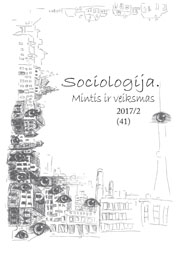„ČIA NE(BUVO) LIETUVA“: KLAIPĖDA PO ANTROJO PASAULINIO KARO – NAUJOSIOS VISUOMENĖS PRISIMINIMAI
‘THERE WAS (NO) LITHUANIA HERE’: KLAIPĖDA AFTER WWII – MEMORIES OF A NEW SOCIETY
Author(s): Sigita KraniauskienėSubject(s): Regional Geography, Social history, WW II and following years (1940 - 1949), Post-War period (1950 - 1989), History of Communism, Ethnic Minorities Studies
Published by: Vilniaus Universiteto Leidykla
Keywords: identity; ethnicity; Russians; Germans; Soviet; postwar; Klaipėda’s region; family history; settlers;
Summary/Abstract: In this article, I address an issue of how structures of cultural, national and generational memories are reproduced in the personalized narratives of the past, and how the meta-narratives of the society are adjusted to the needs of a person in constructing the meaning of the past. The article discusses the complex relationship between ideology and biographical memory: which expressions do individuals use in their personal life stories/family histories about life in postwar Lithuania, and how are the narratives structured by the idea of building a new society, which was a central constituent of the Soviet ideology? How was the image of a new society constructed in the Soviet times and which of its structural components are still actualized in personal life stories/family histories of today’s Russian-speaking community, which was the biggest ethnic group in postwar Klaipėda? The article starts with a brief introduction to the idea of this research and explains why it is focused on the Russian-speaking community in Klaipėda. Following an overview of historical studies on the migration of Russian-speaking people in postwar Lithuania gives a social and demographical profile of the context that structured the collective experience and memories. After an explanation of the analytical model and the methodological assumptions, I proceed to the narrative analysis of life stories/family histories told by Russian-speakers and explore how the narratives are structured by the ideology of the Russified Soviet identity and how this discourse is transformed. By investigating these transformations, I try to show the complex relations between direct and indirect experiences, collective memory as an ideological structure and a city as a living space of different social groups. The analysis of the life stories/family histories of the Russian-speaking community of Klaipėda supports the thesis that the family stories told by these people are transformed taking into account the personal and generational interests to display loyalty to their families and naturalized attachments to their place of residence.
Journal: Sociologija. Mintis ir Veiksmas
- Issue Year: 2017
- Issue No: 41 (02)
- Page Range: 169-198
- Page Count: 30
- Language: Lithuanian

